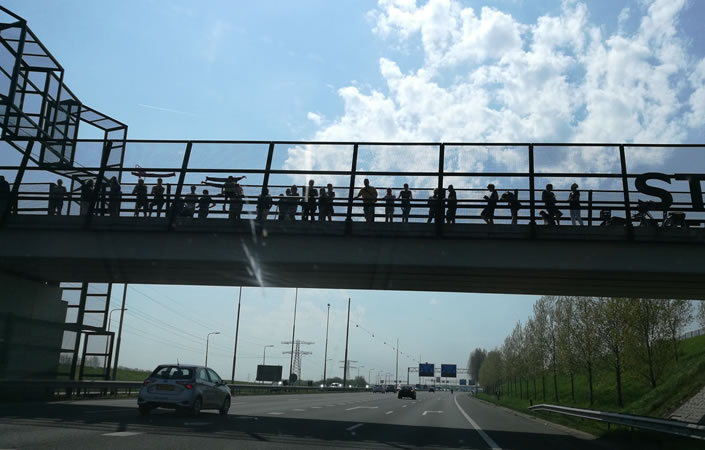2. March 2020

Few remarks on the announcement of the bad news
It is an event that captures the attention of the managers involved. Although it is only one step in a longer process, it is the central event because it sets the tone for the whole following process: the official first announcement.
Moderating such an event requires high emotional stability, the ability to perceive moods in a group early on and to address them sensitively. Without such control, misunderstandings, multiple sensitivities and unrecorded emotions take over the direction of the event.
It is important to involve all managers in the preparation – because they determine an important part of the evaluative assessment of the situation in side conversations, in their posture, in what they do not say and what they say afterwards – they are an important part of the social calibration. Often they are not involved enough, it is overlooked that they themselves are also affected and by preparing for the event and the process afterwards, they also have to and can clarify their own attitude. The mantra applies: Show presence!
It is understandable that intensive preparation is shunned again and again – one deals with an emotionally stressful and difficult topic and sometimes the desire to have already left it behind outweighs. However, with a joint intensive preparation of this event the foundation for the sustainability of the whole following process is laid and this process is not linear, it needs the ability to work iteratively as a leadership group and to deal with surprises, reversals and corrections.
Too often, very differentiated presentations are shown – they are politically and legally coordinated and usually too complicated. It is therefore important to work with the executives on stage to turn the complicated and differentiated slides into simple statements – at least when speaking. It’s all about striking the local tone.
Always too short, too loveless, only partially understanding the importance – the dialogue part of the proclamation. Here it is not just about asking questions, but about creating space for speaking. There are often only statements that ask nothing, but say what is happening emotionally. This space is of high importance, because here the people experience whether it is also about them or only about the handling of an economic problem. Here it is also conveyed that it is good, right and allowed to show emotions. After all, this is a situation in which then also the managers are no longer only preachers and explain, but also become visible and perceptible in their own emotionality. In these moments the feeling of togetherness, of being together, is created, even if the tasks and concerns are very different.
If an employee who knows that he will lose his job and who is still at a loss as to what to expect, goes to the responsible manager after such an event, by looking into his eyes and saying: »This is really bad and I don’t know what I can do now, but thank you for your clear words«, then together – the moderator, the managers and the group – have laid the foundation for a process in which everyone knows: We do the best we can in this situation and we do it for the community of all people who are affected.
Rüdiger Müngersdorff, Fetiye Sisko
Photo: David Straight by unsplash.com
2. March 2020

Transparency makes credible – the need for honest leadership
It is a classic starting situation: A general manager, a plant manager, a divisional manager is informed that significant redundancies are imminent in his area, that a site is to be closed or an entire business unit sold. There may have been a hunch, and yet it is always shocking. The person in charge experiences what he will have to communicate to the employees in the near future. And he/she very quickly feels that he/she feels left alone and that he/she only receives reliable information in slices. The situation is confusing and will remain so for quite some time. It is the first scene in a process that now follows, in which every scene has to be rethought and redesigned again and again.
SYNNECTA has been supporting companies and responsible managers for many years in the design of such processes, which focus on communication. It is a different kind of communication – it requires a much higher degree of transparency, honesty and credibility than standard communications and it cannot be delegated. The communication cascades are already problematic in normal times, in crisis communication they are dangerous – the uncontrollable infectious rumor bags are created.
Our affected manager has a first task – he/she must form a team, a management team, which is able to deal sensitively with the situation from their own concern and is prepared to show a high level of presence throughout the entire process. We know the closure process from managers who like to visit the headquarters in such times. The management team with clear knowledge of the task and an honest willingness to go down this path with all employees is the backbone of the process. It is the time when the local managers, the micro-politics learned in seminars and their own tactical behaviour have to leave behind. Fetiye Sisko, who has supported many companies in these phases, says that in the beginning, support always involves developing a common attitude, which makes it clear that the focus is always on all the people concerned.
The people entrusted with communication are too often still young employees, without their own network, with little experience and little influence on content. Their commitment is often remarkable and yet they need support. Because crisis communication has a few special features. Again and again we experience phases of confusion, anger and rage when discrepancies become visible on the various communication channels. In particular, synchronised external and internal communication is required – any discrepancies spread by the press, social media, etc. must be included in internal communication. This is the only way to prevent irritations from the outside to the inside and to avoid strong emotional reactions. Differences in communication create mood and the situation is unstable.
The lively Q&A is an important component in successful crisis communication – every question stands for a need and a necessity, every question must be answered. And if it cannot be answered in the status of the process, exactly this must be said and justified. This is the only way to actively shape the mood part of a crisis and, as experience shows, to prevent the emotional substitutes such as actions of sabotage, refusal to work, etc. This also makes it clear that crisis communication is an iterative process; none of them proceeds in the way that very clever people, who are far away from what is happening, have imagined in advance.
As we have already said, delegation to a communication cascade is not helpful – it creates differences in communication and is no longer controllable by the responsible management team. Therefore it is essential for us to communicate with everyone at the same time as often as possible. Dialogue is already important in a normal situation, here it becomes decisive. It is one of the aims of crisis communication to reduce rumours, and for this to happen, joint communication experiences are needed. They are emotional, sometimes turbulent in the middle – but what happens in a meeting does not happen outside. Of course, this requires an experienced moderator who is able to keep an overview even in emotionally violent reactions and who can behave with appropriate empathy towards everyone.
We have had good experience in organising communication meetings together with the works council, employee representatives and management. This is where similarities become visible and differences become transparent. Each side has a different role and yet they are jointly responsible for shaping the situation for the people. And here again, every concern is to be taken seriously. In one case, the management had a reduction target which in their eyes was marginal (below the 10% mark) and therefore did not consider extensive communication necessary. One morning, the managers came to the site and saw 100 scarecrows wearing black T-shirts by the fence. It was the number of those to be dismantled. It may hit 100 people in the end, but in the beginning it hits everyone. And the principle is, what you do to one, you do to all.
There are many important characteristics of crisis communication – its quality makes a big difference, for the employees concerned and for the company. It takes experience to design such processes – and always a high level of emotional competence. Managers who have to deal with insecure people on a daily basis, and who are often insecure themselves, need support in these phases. If the attitude in the management circle is right, a constant empathic behaviour can be learned. Transparency, honesty and empathy are essential behavioural aspects in these processes. We at SYNNECTA are happy to do this task, even where it is very difficult, if one thing is given: the responsible leadership wants to make the process as honest and appreciative as possible for all those involved.
Rüdiger Müngersdorff/Fetiye Sisko
Photo: Hanna Göhler
8. February 2019

You are searching for an experienced speaker? Dr. Rüdiger Müngersdorff is listed at EdEx. Leadership development made easy: An ExEdService Pack that not only provides an excellent overview, but also direct access to more than 100 trainers from the best business schools worldwide.
The advantages of the Service Pack
+++ A comprehensive analysis of the market and the providers, action-oriented decision matrices, numerous interviews provide valuable assistance.
+++ A unique data base offers direct access to more than 100 trainers from the best business schools worldwide. Searchable by topic, language and industry.
Another bonus for you: As a customer of SYNNECTA, this comes at a discount price of € 399 instead of the regular € 499.
Please find further details at exedservicepack.com.
For further information or if you are interested in booking the ExEdService Pack please write an Email to Sabine Römisch: roemisch@synnecta.com



